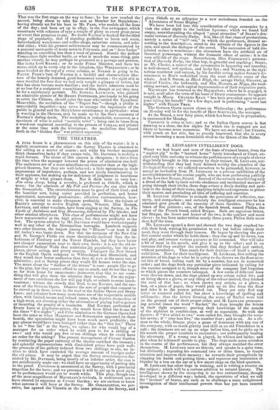M. LEONARD'S INTELLIGENT DOGS.
WHAT we had heard and seen of the feats of trained brutes, from the- " sapient pig" to the "learned horse" lately introduced at Court, ex- cited very little curiosity to witness the performances of a couple of clever dogs lately brought to this country by their trainer, M. LEONARD, not- withstanding that they had been deemed worthy the attention of the Zoological Society : we suffered ourselves to be persuaded, however, to accept an invitation from M. LEONARD to a private exhibition of the accomplishments of his canine pupils, who are now performing publicly at the Lowther Rooms, Strand. Instead of the animals manifesting only a dread of the lash by their servile obedience and mechanical manner of going through their tricks, these dogs evince a lively docility and apti- tude in the doing of their tasks, implying delight and eagerness to please their master, and precluding all idea of suffering and coercion. M. Lzoirear attributes to animals the possession of reflection, me- mory, and comparison ; and certainly the intelligent creatures he has educated give proofs of the exercise of those faculties. They are a brace of fine pointers ; one, of the Spanish breed, named Philax, the other of the French breed, called Braque. Both are sagacious brutes, but Braque, the lesser and leaner of the two, is the quicker and more clever : he has been under tuition nearly three years, Philax little more than half the time.
Mr. LEONARD opened a door and showed the two dogs couched be- side their food, waiting his permission to eat; but before taking their meal, they went through their lessons. He began by showing the per- fect control under which he holds them : they rise up and lie down, run and play, and assume various postures at his command. One will take a bit of meat in his mouth, and give it up to the other ; and in no instance did they swallow the morsels that they fetched and carried, without permission. Thus much for their docility—of itself a curious exhibition. Now for their intelligence. M. LEONARD, first calling the attention of his dogs to what he is going to do, throws on the floor seve- ral bits of bread, calling each bit by a number, but not in numerical order ; and the dogs fetch any particular piece indicated by calling for the number assigned to it, though some of the company had forgotten to which pieces the numbers belonged. A few cards of different hues were thrown down, and the dogs picked up any colour called for ; and on being shown a glove, or any thing of the colour desired, they fetched the card of that hue ; so when shown any article, as a glove, a box, or a piece of paper, they would pick up its like from the floor and take it to the person pointed out. They not only find any letter or numeral called for, but show a knowledge of spelling and arithmetic : thus the letters forming the name of Rachel were laid on the ground out of their proper order, and M. LEONARD pronounc- ing several times the word " Rachel," the dogs brought the letters in their right sequence ; proving their knowledge of the sounds of the alphabet in combination, as well as separately. So with the figures ; if "five added to two" were called for, they brought the num- ber seven ; if "nine less five," the number four; and so on. As a cli- max to the whole, Braque plays a game of dominoes with any one of the company, with as much gravity and skill as an old Frenchman in a café : the dominoes are set up on edge before him, and he picks up in his mouth the proper numbers in succession ; not unfrequently beating his adversary. If a wrong one is played, he whines and barks; and also when he is himself unable to play. The dogs made some mistakes in the course of the performance, but they always rectified the error themselves. 311. LEONARD uses no threats, and speaks in a quiet tone, but .distinctly ; repeating his command two or three times, to insure attention and impress their memory : he rewards their promptitude by clapping his hands and patting them ; and reproves any inattention or blander by a box on the ear or a few smart slaps on the hind-quarters. M. LEONARD has other dogs in training, and is writing a treatise on the subject ; which will be a curious addition to natural history. The intelligence shown by the sheep-dog is no less extraordinary, though developed in a different way ; indeed, the operations of what we call the "instinct" of brutes, are such as to challenge a more enlightened investigation of their intellectual powers than has yet been entered upon.


























 Previous page
Previous page